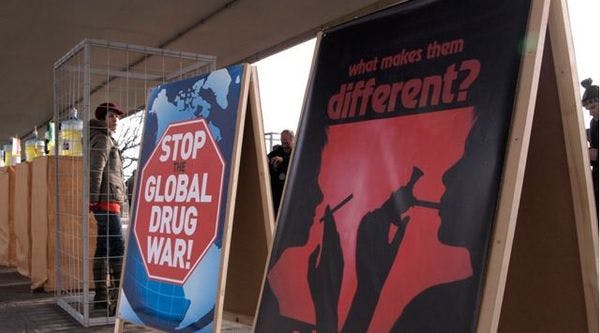Soyons réalistes au sujet des drogues - Concours d'affiches
The Rights Reporter Foundation (RRF) accepte désormais les soumissions au concours d'affiches "Soyons réalistes au sujet des drogues", faisant partie de leur campagne de sensibilisation aux alternatives des politiques des drogues punitives. Pour en savoir plus, en anglais, veuillez lire les informations ci-dessous.
Abonnez-vous à l'Alerte mensuelle de l'IDPC pour recevoir des informations relatives à la politique des drogues.
Call For Submissions
The Rights Reporter Foundation (RRF) is now accepting submissions to the “Let's Get Real About Drugs!” poster contest, as part of our campaign to raise awareness on alternatives to punitive drug policies. The contest is targeting the 20-year review of global drug control efforts at the United Nations General Assembly Special Session (UNGASS) on drugs in New York, April 2016. For details and the rules of the contest, please see below.
What is the UNGASS and why is it significant in drug history?
In April 2016, the UN will hold a General Assembly Special Session (UNGASS) on drugs – a meeting of high-ranking government officials in New York to review the past 20 years of global drug control efforts and to adopt an outcome document. The last UNGASS on drugs took place in New York 20 years ago, in 1998. That meeting was dominated by the slogan “A drug-free world: we can do it!” and, accordingly, the target adopted was to significantly reduce the demand and supply of illicit drugs within 10 years.
Twenty years later, we can see that member states have failed to achieve these targets. The problem is, that drugs are here to stay - a drug-free world is an illusion. However, we have learned in these 20 years what really works instead of more repression: more prevention, more treatment and more harm reduction. What works is not punishment - but investing in public health, respecting human rights and providing social care for vulnerable people. We have robust scientific evidence proving that programs such as needle and syringe programs, community treatment, street outreach, drug consumption rooms, opiate substitution treatment, drug checking, interactive school prevention, social reintegration are not only very effective in reducing drug-related harms, but save money for the whole of society. Still, governments spend trillions of dollars on drug law enforcement, but only a fragment of what would be needed on harm reduction programs. The first draft of the UNGASS outcome document does not event mention harm reduction programs. This is unacceptable in the 21st century!
For further reading on the UNGASS 2016 and its significance, see:
What is UNGASS 2016? (Open Society Foundations)
The International Drug Policy Consortium’s official website
UNGASS: Weighing the Chances (Drugreporter)
Why did we launch this contest?
We can see from recent UN statements that there is a spirit of reform in the air – but without pressure from civil society, we cannot expect governments to do anything other than congratulate themselves for what they have done already. There is very little knowledge or discussion, amongst the general public, about the failure of the punitive drug policies and the success of harm reduction – therefore we need to raise public awareness of the harms caused by this system, and promote alternatives to the current framework. This is the intended purpose of the posters we are calling for. The posters will be exhibited in New York City during the UNGASS in April.
What Kind of Posters Are We Looking for?
This contest aims to contribute to the above aim by highlighting the unintended consequences of drug control efforts on public health, crime, environment, human rights – by articulating personal stories and tragedies, lost opportunities and liberties, and the irreversible damage that has been caused to lives and property. We are also looking for posters pointing out what really works instead of punishment: harm reduction and treatment programs, reality-based education, pragmatism, success stories, lives spared and money saved. We are looking for creative, attention-grabbing and poignant images which will graphically express the everyday reality and impact of the global drug war on public health, public security and human rights.
Deadline for poster submission is the 15th of March, 2016
Click here to have more information about the contest rules, recommended topics and prizes.
Keep up-to-date with drug policy developments by subscribing to the IDPC Monthly Alert.
Thumbnail: Drug Reporter
